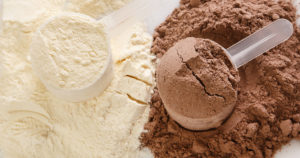Protein is a macronutrient found in many foods such as meats, dairy products, nuts and legumes. It is comprised of amino acids which are the building blocks of body tissue that also promotes healthy skin, hair, bones and muscles.
Protein powders are concentrated sources of protein derived from animal or plant foods, such as dairy, eggs, rice or peas. Powders typically come in two forms:
- Protein concentrates: These types are produced by extracting protein from whole foods using heat and enzymes. They typically yield anywhere from 60 – 80% protein, while the remaining 20 – 40% are composed of fat and carbohydrates.
- Protein isolates: This method incorporates an additional filtering process, removing more fat and carbohydrates and further concentrating the protein. Protein isolate powders contain anywhere from 90 – 95% protein.
 Although experts suggest that active adults obtain the bulk of their protein from whole food sources (stay away from processed!), protein supplements are still a great alternative. That being said, it is important to note that not all protein supplements are created equal. Here are some of the most popular and readily available protein supplements, who is best suited for their specific benefits and under which circumstances you should avoid altogether.
Although experts suggest that active adults obtain the bulk of their protein from whole food sources (stay away from processed!), protein supplements are still a great alternative. That being said, it is important to note that not all protein supplements are created equal. Here are some of the most popular and readily available protein supplements, who is best suited for their specific benefits and under which circumstances you should avoid altogether.Whey Protein
The most popular protein supplement on the market today, whey is a byproduct produced during the process of turning dairy milk into cheese. Whey protein has been shown to promote lean muscle growth and fat loss, as well as supporting cardiovascular health.
Who should use whey protein?
Whey protein is not only a better option for workouts (due to its quick absorption) but also because of its amino acids profile. It contains high levels of branched-chain amino acids, like leucine, which jumpstarts the process for building and repairing muscle—ideal for bodybuilders or anyone hoping to tone and/or cultivate muscle mass. Alternatively, whey protein powder in its purest form can be added to a smoothie or shake and stand in as a meal replacement for those looking to take advantage of its accelerated fat loss properties.
Consider this:
The sugar found in milk (lactose) is a common allergen that can make whey indigestible for some. Lactose-intolerant users should be able to find a supplement that meets their dietary needs. Also, with any protein powder that comes available in various flavours, remember that they also often (depending on the brand) come with a significant amount of unhealthy artificial sweeteners and chemicals.
Recommended dosage: as always, follow the directions on product label. Typically, 25 – 50 grams per day, after a workout. If your daily protein intake is already high, adjust your dosage accordingly.
Try this deal: Optimum Nutrition Gold Standard 100% Whey, 5 Pounds (2.27kg)
Casein Protein

Casein is similar to whey in that they are both derived from the same extraction process during cheese-making. Special enzymes are added to heated milk which causes the casein in the milk to coagulate, separating from a liquid substance. The liquid substance is the whey protein. The remaining curds of casein are dried to create a protein powder.
Who should use casein protein?
Casein is a very high-quality protein that contains all of the essential amino acids (which one must obtain from food since they are not produced in the body). These amino acids are easily digestible and absorbed, making it an optimal protein choice before bed. Again, ideal for bodybuilders and active adults seeking a boost in muscle growth.
Consider this:
Casein is not recommended as a post-workout supplement because it is absorbed so slowly. For best results after you sweat, combine with a whey supplement. Casein is also more expensive than whey, so it is always best to buy when on sale. Like whey, casein is a byproduct of cheese production, so lactose intolerant users take note.
Recommended dosage: as always, follow the directions on product label. Typically, 30 – 40 grams per day, ideally before bed. Post workout, try adding 10 – 20 grams of casein to your whey protein. If your daily protein intake is already high, adjust your dosage accordingly.
Try this: Optimum Casein Protein, 900g
 Pea Protein
Pea ProteinPea protein is one of the best plant-based forms available. It is obtained by drying and grounding peas into a fine flour, combining it with water, and removing the fiber and starch, leaving you with mostly protein, vitamins and minerals. And, as you can imagine, it’s taste profile is pleasantly unique.
Who should use pea protein?
Pea protein comes from the yellow split pea, making it a popular choice for vegetarians and vegans alike. Like most plant-based proteins, pea protein is hypoallergenic which is great for people with allergies and intolerances. And with few additives or artificial ingredients, this one appeals to those looking for protein sources closest to the whole-food source.
Consider this:
Pea protein remains deficient in certain amino acids and should not be considered a primary source of dietary protein. It is low in methionine, however, methionine is abundant in foods like chicken, oats and eggs (see above).
Recommended dosage: as always, follow the directions on product label. Typically, pea protein powder comes with a suggested serving size of 30 grams per day. Athletes and adults who exercise more than three times per week can safely double that recommended daily dose.
Try this deal: Clean Nutrition Pea Protein, 2kg
Egg White Protein
Egg white protein is always a great, low-calorie, fat-free option. It is a complete protein derived by separating the yolks and dehydrating the egg whites. All vital ingredients that make egg whites so nutritious are retained in their purest form, along with a comprehensive amino acid profile.
Who should use egg white protein?
Aside from just protein, egg protein powders are rich in vitamins and minerals that can contribute to a healthy diet. Egg white protein is also virtually free of fat and carbohydrates. And, as eggs are such a common ingredient, protein powder can be added to baking and cooking for added protein that is low in cholesterol. Just about anybody interested in protein supplements can benefit from egg white powder.
Consider this:
Egg allergies are extremely common, especially in children and young adults. If you are known to have any intolerance/reactionary issues, do not attempt to consume before speaking to your doctor. Additionally, egg white protein is one of the most expensive supplements available.
Recommended dosage: as always, follow the directions on product label. The average man requires about 56 grams of protein per day, while the average woman needs about 46 grams. An average-sized egg contains about 6 – 7 grams of protein.
Try this: Zealea Egg White Powder, 1kg
Soy Protein
Soybeans are one of the few plant protein sources offering all of the essential amino acids, making it a valuable part of any diet. In order to deliver it in powder form, the protein is concentrated or isolated after the soybeans have been hulled and dried into soy flour.
Who should use soy protein?
For active adults who are vegetarian or vegan, soy is one of the most popular and beneficial proteins, as its properties tend to fill in for the nutrients that are absent from meatless and dairy-free diets. Protein from the soybean may also help to improve the body’s immune function and promote bone health, while simultaneously preventing cardiovascular disease and reducing the risk of some cancers.
Consider this:
Soy contains phytoestrogens called isoflavones that can mimic the activity of the hormone estrogen—as such, too much soy can mean too much estrogen. It is best not to overindulge in soy, especially if you are pregnant and/or lactating.
Recommended dosage: as always, follow the directions on product label. Much of the information available claims that a daily soy dosage varies depending on the user’s age and weight group. With this in mind, it is reasonably safe to consider 50 grams to be the daily maximum amount for soy protein.
Hemp Protein
Hemp protein has recently become a popular plant-based option in the supplement industry. It is derived from the seeds of the cannabis plant, but don’t let that worry you…
Who should use hemp protein?
Hemp is often referred to as a “superfood” due to its mix of essential fatty acids; hemp is a high-quality, vegan-friendly protein containing all nine essential amino acids, in addition to fiber, minerals and healthy fats. It is also hypoallergenic. Hemp is safe for most adults, although digestive problems have been linked to its use in powder form. People with hemp allergies should not use hemp protein.
Consider this:
As the hemp seed is only harvested in large quantities—and only in select countries due to its affiliation with the cannabis plant, hemp protein powder is typically one of the most expensive supplements available. While the hemp seed is virtually absent of THC, the hallucinogenic element associated with marijuana, it is always recommended that you purchase any hemp product or byproduct from a reputable vendor. Contrary to popular belief, hemp does not affect drug test results.
Recommended dosage: as always, follow the directions on product label. This is another example of a supplement that measurable based on weight: adults require about 0.36 grams of protein per pound, every day. For a 150-pound adult, this works out to about 55 grams per day.









Join the Discussion
Type out your comment here:
You must be logged in to post a comment.